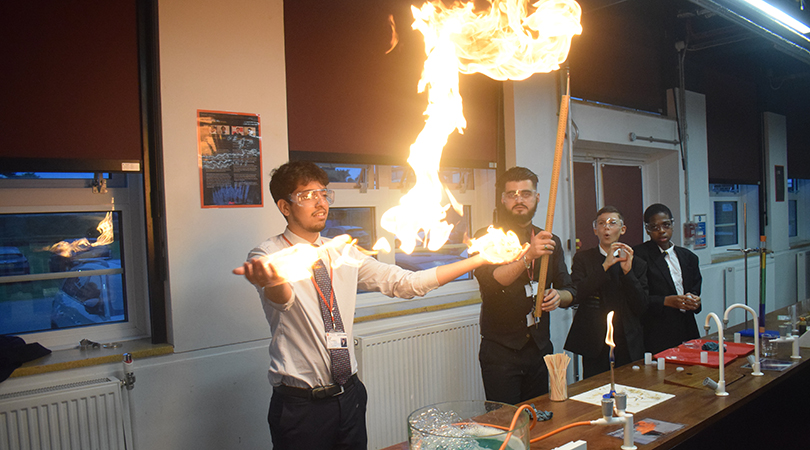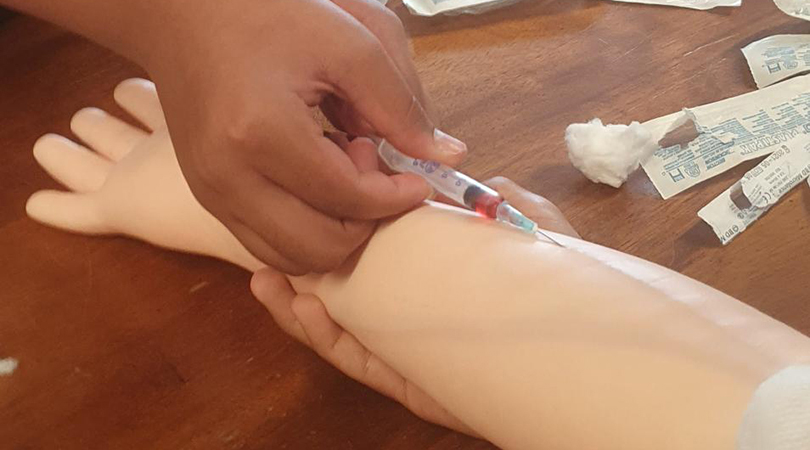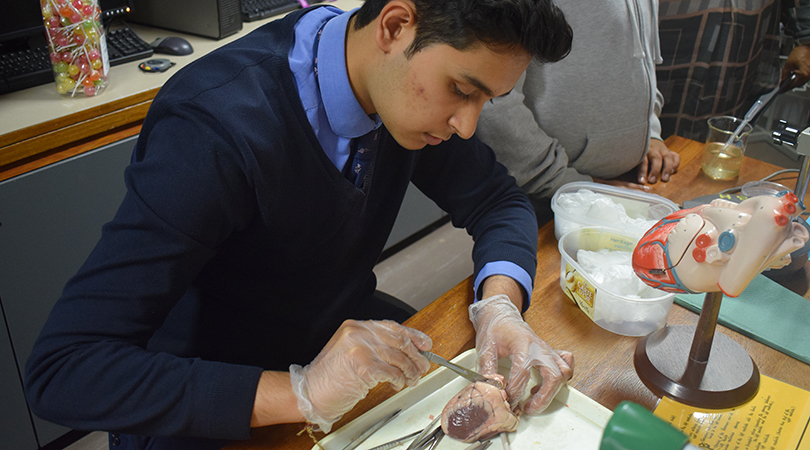 Throughout their curriculum, students are able to take part in practical experiments. This example features a Sixth Former during Open Evening!
Throughout their curriculum, students are able to take part in practical experiments. This example features a Sixth Former during Open Evening! Students are taught the importance of safety within the laboratory at all times.
Students are taught the importance of safety within the laboratory at all times. During Wider Learning Week, students can take part in unique experiments!
During Wider Learning Week, students can take part in unique experiments! Medic Club is aimed at Year 12 students with an interest in taking medicine at university.
Medic Club is aimed at Year 12 students with an interest in taking medicine at university.
Summary
Curriculum Content
Curriculum
Biology 1
- Cells
- Microscopes
- Plants
Chemistry 1
- Particle model
- Changes of state
- Density
- Gas pressure
Physics 1
- Forces
- Balanced and unbalanced forces
Biology 2
- Leaf structure
- Photosynthesis
Chemistry 2
- Pure and impure substances
- Melting and boiling points
- Separation techniques
Physics 2
- Energy
- Work done
- Sound
Assessment
At the end of each unit, students will take a written test to see what they have learned. In every unit, there is also an extended literacy task. At the end of Year 7, students sit a written examination.
Progress & Preparation Activities (PPA)
PPA is set on Insight / Parent Portal by class teachers generally on a weekly basis.
Further Resources
The school has a subscription to The Day, an online news service for schools. Click the button to the right, then browse ‘Subjects’ in the top menu to find science resources.
Please see below for a number of resources to maximise students’ progress during their Year 7 curriculum.
- BBC Bitesize: KS3 – revision tool from the BBC, including videos and games.
- Education Quizzes: KS3 Science – educational online quizzes testing knowledge on science topics.
- BBC Bitesize: Science Videos – science revision videos.
- Podcasts – science podcasts linking the curriculum to the everyday world.
Curriculum
Biology 3
- Balanced diet
- Digestion
- Respiration
Chemistry 3
- Periodic table
- Compounds and mixtures
- Properties of metals and non-metals
Physics 3
- Magnets
- Gravity
- Pressure
Biology 4
- Reproduction and pregnancy
- Muscles
- The skeleton
- Breathing
Chemistry 4
- Reactions of acids
- Conservation of mass
- Chemical and physical changes
Physics 4
- Circuits
- Electromagnets
Assessment
At the end of each unit, students will take a written test to see what they have learned. In every unit, there is also an extended literacy task. At the end of Year 8, students sit a written examination.
Progress & Preparation Activities (PPA)
PPA is set on Insight / Parent Portal by class teachers generally on a weekly basis.
Further Resources
The school has a subscription to The Day, an online news service for schools. Click the button to the right, then browse ‘Subjects’ in the top menu to find science resources.
Please see below for a number of resources to maximise students’ progress during their Year 8 curriculum.
- BBC Bitesize: KS3 – revision tool from the BBC, including videos and games.
- Education Quizzes: KS3 Science – educational online quizzes testing knowledge on science topics.
- BBC Bitesize: Science Videos – science revision videos.
- Podcasts – science podcasts linking the curriculum to the everyday world.
Curriculum
Biology 5
- Drugs
- Smoking and alcohol
- Microbes and immunity
Chemistry 5
- Endothermic and exothermic reactions
- Reactivity
- Combustion
Physics 5
- Speed
- Moments
- Space
Biology 6
- Variation
- Natural selection
- Cloning
- Extinction
Chemistry 6
- Structure of the earth
- Rock cycle
- Carbon cycle
Physics 6
- Waves
- Light
- Heat
Assessment
At the end of each unit, students will take a written test to see what they have learned. In every unit, there is also an extended literacy task. At the end of Year 9, students sit a written examination.
Progress & Preparation Activities (PPA)
PPA is set on Insight / Parent Portal by class teachers generally on a weekly basis.
Further Resources
The school has a subscription to The Day, an online news service for schools. Click the button to the right, then browse ‘Subjects’ in the top menu to find science resources.
Please see below for a number of resources to maximise students’ progress during their Year 9 curriculum.
- BBC Bitesize: KS3 – revision tool from the BBC, including videos and games.
- Education Quizzes: KS3 Science – educational online quizzes testing knowledge on science topics.
- BBC Bitesize: Science Videos – science revision videos.
- Podcasts – science podcasts linking the curriculum to the everyday world.
Summary
For more information on each course, please see below.
GCSE Combined Science
Level: GCSE
Examination Board: AQA
Curriculum
Students will study the following topics:
Biology
- Cell biology
- Organisation
- Infection and response
- Bioenergetics
- Homeostasis and response
- Inheritance, variation and evolution
- Ecology
Chemistry
- Atomic structure and the periodic table
- Bonding, structure, and the properties of matter
- Quantitative chemistry
- Chemical changes
- Energy changes
- The rate and extent of chemical change
- Organic chemistry
- Chemical analysis
- Chemistry of the atmosphere
- Using resources
Physics
- Energy
- Electricity
- Particle model of matter
- Atomic structure
- Forces
- Waves
- Magnetism and electromagnetism
Assessment
Biology Paper 1 – Topics 1-4
Written examination – 1 hour 15 minutes – 16.7% of GCSE grade (sat at the end of Year 11)
Biology Paper 2 – Topics 5-7
Written examination – 1 hour 15 minutes – 16.7% of GCSE grade (sat at the end of Year 11)
Chemistry Paper 1 – Topics 8-12
Written examination – 1 hour 15 minutes – 16.7% of GCSE grade (sat at the end of Year 11)
Chemistry Paper 2 – Topics 13-17
Written examination – 1 hour 15 minutes – 16.7% of GCSE grade (sat at the end of Year 11)
Physics Paper 1 – Topics 18-21
Written examination – 1 hour 15 minutes – 16.7% of GCSE grade (sat at the end of Year 11)
Physics Paper 2 – Topics 22-24
Written examination – 1 hour 15 minutes – 16.7% of GCSE grade (sat at the end of Year 11)
The teaching of separate science takes place in Year 11.
Further Resources
The school has a subscription to The Day, an online news service for schools. Click the button to the right, then browse ‘Subjects’ in the top menu to find science resources.
Please see below for a number of resources to maximise students’ progress during their Year 10 curriculum.
- My GCSE Science – video tutorials for GCSEs in biology, chemistry and physics.
- BBC Bitesize: GCSE Science – only revision for all aspects of science.
- YouTube: DoodleScience – short videos covering most of the GCSE science topics for AQA.
- S-Cool – revision guides, games and resources for GCSE science.
GCSE Biology
Level: GCSE
Examination Board: AQA
Curriculum
In Year 11, students will study the following topics:
- Cell biology
- Organisation
- Infection and response
- Bioenergetics
- Homeostasis and response
- Inheritance, variation and evolution
- Ecology
- Key ideas
Assessment
Biology Paper 1 – Topics 1-4
Written examination – 1 hour 45 minutes – 50% of GCSE grade
Biology Paper 2 – Topics 5-8
Written examination – 1 hour 45 minutes – 50% of GCSE grade
Further Resources
The school has a subscription to The Day, an online news service for schools. Click the button to the right, then browse ‘Subjects’ in the top menu to find science resources.
Please see below for a number of resources to maximise students’ progress during their Year 11 curriculum.
- My GCSE Science – video tutorials for GCSEs in biology, chemistry and physics.
- BBC Bitesize: GCSE Science – only revision for all aspects of science.
- YouTube: DoodleScience – short videos covering most of the GCSE science topics for AQA.
- S-Cool – revision guides, games and resources for GCSE science.
GCSE Chemistry
Examination Board: AQA
Curriculum
In Year 11, students will study the following topics:
- Atomic structure and the periodic table
- Bonding, structure, and the properties of matter
- Quantitative chemistry
- Chemical changes
- Energy changes
- The rate and extent of chemical change
- Organic chemistry
- Chemical analysis
- Chemistry of the atmosphere
- Using resources
Assessment
Chemistry Paper 1 – Topics 1-5
Written examination – 1 hour 45 minutes – 50% of GCSE grade
Chemistry Paper 2 – Topics 6-10
Written examination – 1 hour 45 minutes – 50% of GCSE grade
Further Resources
The school has a subscription to The Day, an online news service for schools. Click the button to the right, then browse ‘Subjects’ in the top menu to find science resources.
Please see below for a number of resources to maximise students’ progress during their Year 11 curriculum.
- My GCSE Science – video tutorials for GCSEs in biology, chemistry and physics.
- BBC Bitesize: GCSE Science – only revision for all aspects of science.
- YouTube: DoodleScience – short videos covering most of the GCSE science topics for AQA.
- S-Cool – revision guides, games and resources for GCSE science.
GCSE Physics
Examination Board: AQA
Curriculum
In Year 11, students will study the following topics:
- Energy
- Electricity
- Particle model of matter
- Atomic structure
- Forces
- Waves
- Magnetism and electromagnetism
- Space physics
Assessment
Physics Paper 1 – Topics 1-4
Written examination – 1 hour 45 minutes – 50% of GCSE grade
Physics Paper 2 – Topics 5-8
Written examination – 1 hour 45 minutes – 50% of GCSE grade
Further Resources
The school has a subscription to The Day, an online news service for schools. Click the button to the right, then browse ‘Subjects’ in the top menu to find science resources.
Please see below for a number of resources to maximise students’ progress during their Year 11 curriculum.
- My GCSE Science – video tutorials for GCSEs in biology, chemistry and physics.
- BBC Bitesize: GCSE Science – only revision for all aspects of science.
- YouTube: DoodleScience – short videos covering most of the GCSE science topics for AQA.
- S-Cool – revision guides, games and resources for GCSE science.
Summary
We are committed to providing a range of experiences, both inside and beyond the classroom, to ensure our students are independent, analytical learners who will flourish in science-based careers. Every single year, students from the science department apply to Oxbridge, and embark on the first steps to becoming doctors, dentists and engineers.
A level Biology
Level: A level
Examination Board: Edexcel B
Curriculum
Over the course, students will study the following topics:
- Biological molecules
- Cells, viruses and reproduction
- Classification and Biodiversity
- Exchange and Transport
- Energy for Biological process
- Microbiology and Pathogens
- Modern Genetics
- Origins of Genetic Variation
- Control Systems
- Ecosystems
Assessment
Paper 1: Topics 1-7
Written examination – 1 hour 45 minutes – 30% of A level
Paper 2: Topics 1-4 and 8-10
Written examination – 1 hour 45 minutes – 30% of A level
Paper 3: Topics 1-10
Written examination – 2 hours 30 minutes – 40% of A level
Further Resources
The school has a subscription to The Day, an online news service for schools. Click the button to the right, then browse ‘Subjects’ in the top menu to find science resources.
Please see below for a number of resources to maximise students’ progress during their Year 12 curriculum.
- Edexcel – full A level biology specification and example papers.
- S-Cool – simplified notes and diagrams.
- Biology Innovation – biology revision notes and videos.
- My A level Biology – biology revision videos.
A level Chemistry
Level: A level
Examination Board: AQA
Curriculum
Over the course, students will study the following topics:
- Physical chemistry
- Organic chemistry
- Inorganic chemistry
Assessment
Paper 1: Topics 1-3
Written examination – 2 hours – 35% of A level
Paper 2: Topics 1 & 2
Written examination – 2 hours – 35% of A level
Paper 3: Topics 1-3
Written examination – 2 hours – 30% of A level
Further Resources
The school has a subscription to The Day, an online news service for schools. Click the button to the right, then browse ‘Subjects’ in the top menu to find science resources.
Please see below for a number of resources to maximise students’ progress during their Year 12 curriculum.
- Edexcel – full A level Chemistry specification and example papers.
- A level Chemistry – revision resources for A level students.
- ChemNotes – chemistry revision notes
A level Physics
Level: A level
Examination Board: Edexcel
Curriculum
Over the course, students will study the following topics:
- Working as a Physicist
- Mechanics
- Electric Circuits
- Further Mechanics
- Electric and Magnetic Fields
- Nuclear and Particle Physics
- Materials
- Waves and Particle Nature of Light
- Thermodynamics
- Space
- Nuclear Radiation
- Gravitational Fields
- Oscillations
Assessment
Paper 1: Topics 1-6.1
Written examination – 1 hour 45 minutes – 30% of A level
Paper 2: Topics 1 and 7-13
Written examination – 1 hour 45 minutes – 30% of A level
Paper 3: Topics 1-13
Written examination – 2 hours 30 minutes – 40% of A level
Further Resources
The school has a subscription to The Day, an online news service for schools. Click the button to the right, then browse ‘Subjects’ in the top menu to find science resources.
Please see below for a number of resources to maximise students’ progress during their Year 12 curriculum.
- Edexcel – full A level physics specification and example papers.
- KabMouse Online – online self-study units for AS physics.
- The Leonardo Project – learn AS physics through tutorial videos, flash resources and revision worksheets.
- CyberPhysics – KS5 physics revision and practice questions.
BTEC Level 3 Extended Certificate in Applied Science
Level: BTEC Level 3
Examination Board: Edexcel
Curriculum
Over the course, students will study the following topics:
Mandatory Units
- Unit 1: Principles and Applications of Science 1
- A: Structures and Functions of Cells and Tissues
- B: Periodicity and Properties of Elements
- C: Waves in Communication
- Unit 2: Practical Scientific Procedures and Techniques
- Unit 3: Science Investigative Skills
Optional Units
- Unit 8: Physiology of Human Body Systems
- Unit 9: Human Regulation and Reproduction
- Unit 10: Biological Molecules and Metabolic Pathways
- Unit 11: Genetics and Genetic Engineering
- Unit 12: Disease and Infections
- Unit 13: Applications of Inorganic Chemistry
- Unit 14: Applications of Organic Chemistry
- Unit 15: Electrical Circuits and their Application
- Unit 16: Astronomy and Space Science
Assessment
Unit 1
Written examination – 2 hours – 29% of BTEC
Unit 2
Internal assignment – 21% of BTEC
Unit 3
Written examination – 1 hour 20 minutes – 29% of BTEC
Optional Unit
Internal assignment – 21% of BTEC
Further Resources
The school has a subscription to The Day, an online news service for schools. Click the button to the right, then browse ‘Subjects’ in the top menu to find science resources.
Please see below for a number of resources to maximise students’ progress during their Year 12 curriculum.
- Edexcel – full specification.
- Year 7 science club
- University lectures
- Drop in help sessions
- Medic Club (Sixth Form)

